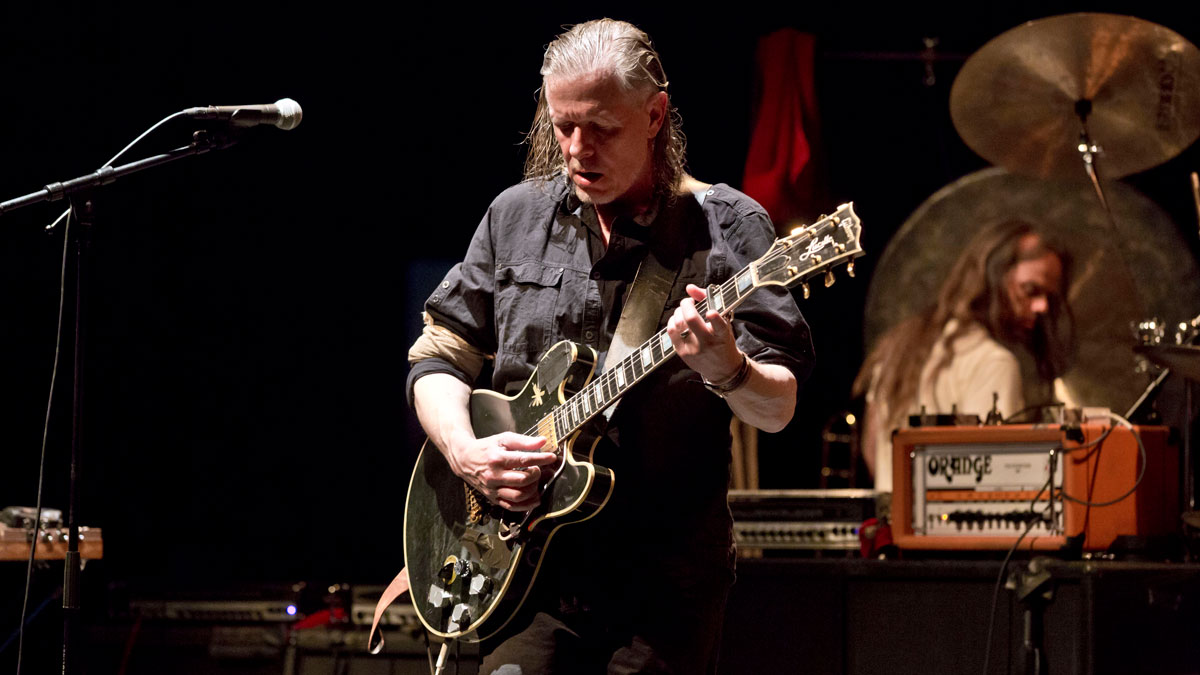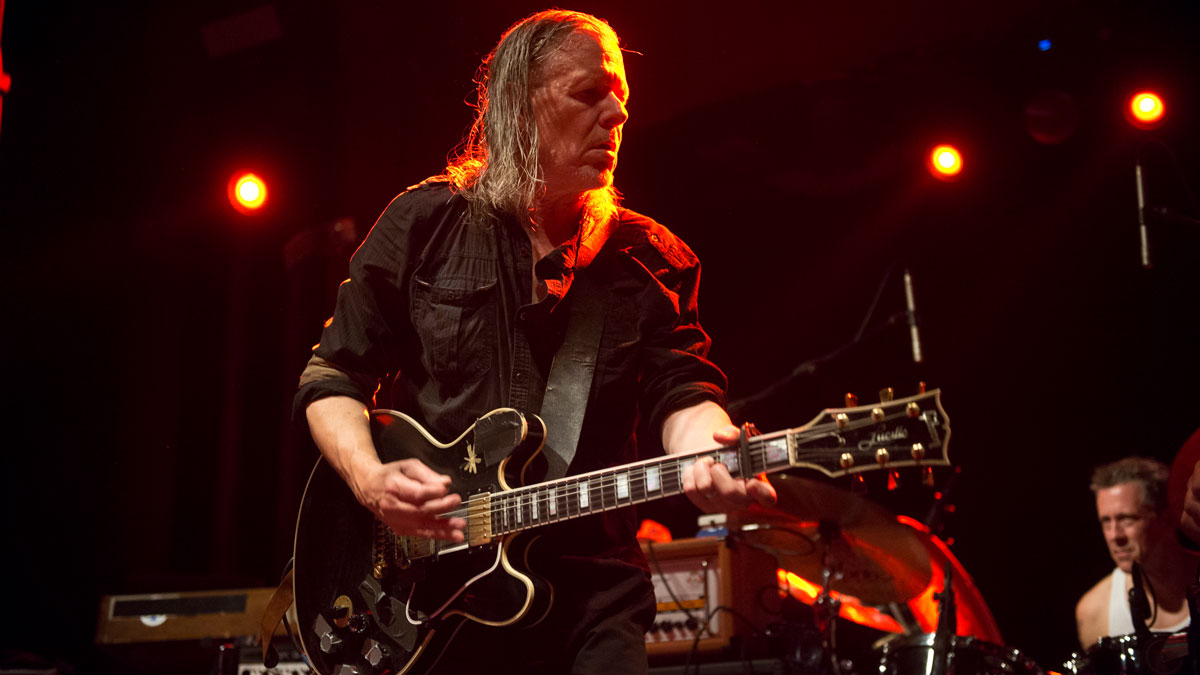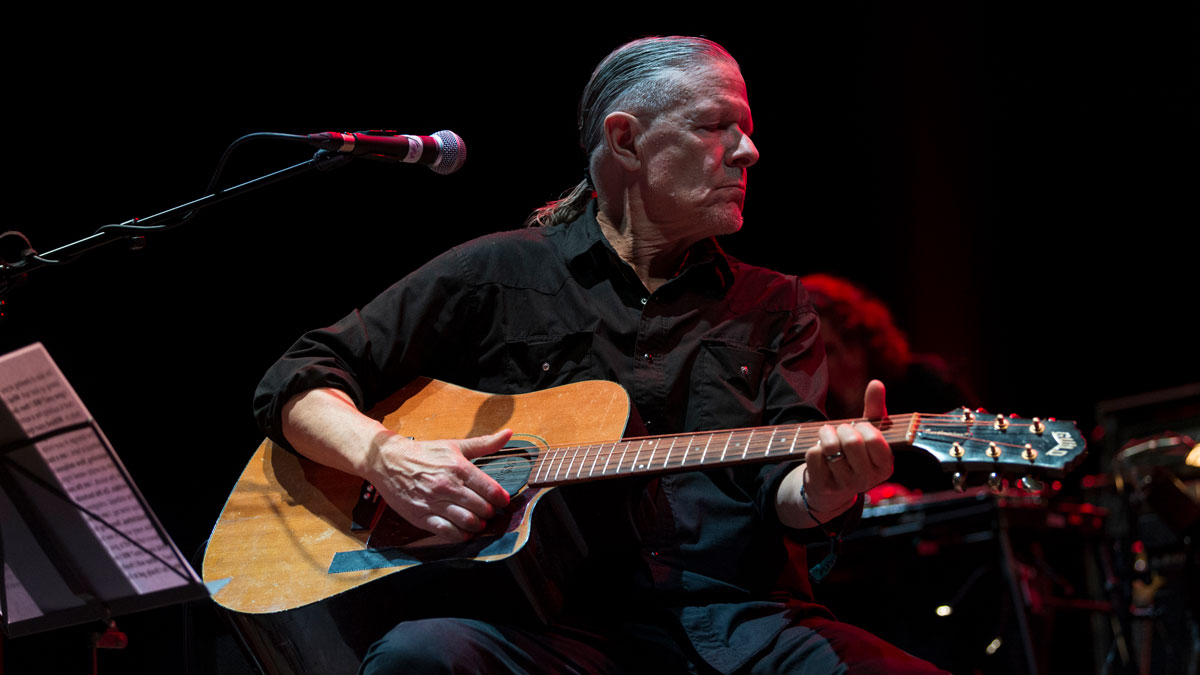
A musical renegade, Swans' Michael Gira has fearlessly explored the depths of multiple genres throughout a 40-plus-year career.
Gira and his eclectic cohorts are at it again on the heels of Swans' latest release, The Beggar. And while the album is badged with the 'drone' tag, don't tell that to Gira, who, like many of his contemporaries, feels genres are as arbitrary as it comes.
"I'm not particularly fond of the word 'experimental'," Gira quips. "To me, it seems so tentative. We just do whatever the fuck we want without apology or any expectations about how it will be received. The main thing is for the music to have an undeniable effect and feel like there's something true in it."
There's no denying that Swans' music is impactful – the band have been cited as a major influence by a wide range of alt-guitar greats, among them Nirvana, Tool, Melvins, Napalm Death and Godflesh, and albums such as 1987's Children of God and 1996's Soundtracks for the Blind remain bona fide classics in noise rock circles.
When asked why he feels many of Swans' classic albums have resonated so deeply with the band's cult fanbase, Gira, laconic as ever, tells us, "You're talking about music from decades ago, so I don't know how to respond to that effectively."
He continues, "But from what I've witnessed personally, the greatest impact we've had seems to have been with the three albums The Seer, To Be Kind, and The Glowing Man from 2012 through 2017. This was a period in the music that I'm fully aware we'll never equal again, at least not in the same way. I'm still recovering from that period and looking for a new way forward."
Gira is firmly rooted in the present as far as the music of Swans is concerned. And given his progressive nature, that mindset checks out. Indeed, Gira is choosing to continuously amalgamate the sounds in his head into something entirely his own rather than conforming to any one musical pasture for too long.
Still, Gira must have guitar-related pride points, right? Apparently, no: "I don't feel I'm really a guitarist per se, so not really. My guitar playing in itself is crude and extremely simple, but whole sonic worlds grow out of it. I'm more interested in the sound and effect of the music as a whole rather than any particular player, including myself."
In support of Swans' latest record, The Beggar, Michael Gira dialed in with Guitar World to dig into his creative process, approach to longer compositions, gear choices, and his quick-hit opinion on the future of guitar.
What was your intent with opening track The Parasite?
"It just seemed like the most seductive atmosphere available among the material we had recorded for The Beggar, a way to draw the listener in. Also, due to the relatively pastoral nature of the arrangement, it works against the expectations one might have regarding the music of Swans. It reminds me of the Disney records I listened to as a child for some reason."
And how about lyrically?
"Lyrically, I think it's an apposite statement to make in our current cultural climate. This song is about being controlled, occupied, and dissolving. I wonder if that's a good thing. In any case, it seems inevitable.
Usually, I find a voicing or two on the guitar that seems to have potential, and I play this repeatedly, listening down close with my ear to the hole in the guitar, letting myself get carried away by the ghost notes I hear
"Its initial inspiration came from staring at my evil cellphone, like everyone else, and being sucked into its nervously spinning vortex, then realizing that a major evolutionary change is now fast occurring, which is a phenomenon you can witness these days walking down any street, for instance, as a rapidly increasing number of hunchbacked pedestrians peer into the hypnotic, glowing portal held just before their faces."
So, it's more of a commentary on the state of the world today as you see it.
"Yes. Humans worldwide willingly open up their minds en masse and allow the corrosive acid of digital information to pour in and transform them from the inside out. It's running through our veins, eating the nutrients in our blood and mutating our DNA. I believe an alien entity or entities is hovering just beyond our possible view, on the other side of the air, plotting the overthrow and, ultimately, the destruction of our consciousness. I'm unsure if this is good or bad, but it has cosmic implications."
When writing, do you envision the entire band eventually being a part of the recording?
"I write the songs on acoustic guitar sitting at my desk in my office. It's not a studio by any means. It's a cluttered mess – like my mind! Usually, I find a voicing or two on the guitar that seems to have potential, and I play this repeatedly, listening down close with my ear to the hole in the guitar, letting myself get carried away by the ghost notes I hear in the open chords I play. These notes, or clusters of notes, are not actually played by me. They're overtones, I guess."

So, that inspires the evolution of the arrangement, then?
"They have a sort of narcotic effect on me and seduce me into dreaming the words into being. They also inspire the ultimate arrangements of the songs. But yes, they conjure up scenes in my head of the band playing the songs, and I think about things they might play. But when actually physically working with the band, I allow a great deal of trust in them to play what's appropriate, what serves the song.
"Along the way, I guide things, I suppose, but according to intuition, both mine and everyone else's. Once a song is finished and we're listening to it loud through studio speakers, I'm often transported back to the moments of listening to the chords with my ear down close to the guitar. Even though my own guitar might have disappeared inside the mix, I still hear the spirit that was hovering around the music alone in my office."
Is the guitar a vehicle for your lyrics, or is the approach fluid depending on the composition?
The pieces would sometimes stretch to 30 to 45 minutes in length. It's what the music called for. The real trick is letting the music play you rather than the reverse
"It's just an inert contraption of wires and wood that I've figured out how to make sounds on. It provides a context for me to sing, talk or scream, depending on what's appropriate.
"Of course, I've gotten better at playing it over the years in my own way. I have no training or technique other than what I've figured out on my own, what works for me personally with my own songs. I can't play a single thing written by anyone else, and I don't want to do so. Usually, I have no idea what the particular chords I'm playing are called. They just make a sound that speaks to me. "
There are several longform compositions featured on The Beggar. What are some of the challenges of filling that amount of space?
"They grow on their own volition, and often the real challenge is to get out of the way and let them develop on their own, to go where they want to go. Often, adding a chord change feels like a betrayal. If anything, I think some of the songs on this current record are too short.
"But I have learned over time to add voices to the long-sustaining chords so that things constantly shift beneath the surface. Sometimes human voices, sometimes sustained, provided by keyboards, vibes, piano, or horns are living there. The goal is usually to find a way to swim through the sound, to make an ocean, a place to escape."
What prompted the shift toward more complex soundscapes?
"Around '95-'97, certain pieces by Swans began to expand in length, especially the songs The Sound, Helpless Child, Blood Promise and Feel Happiness. They just felt like they could and should go on forever, so we let them! When I reconstituted Swans in 2010 after a long hiatus, I took that older material as a starting point for the band's new configuration.
"Live, through improvisation and following the material where it seemed to need to go rather than relying on strict adherence to song structure, the pieces would sometimes stretch to 30 to 45 minutes in length. It's what the music called for. The real trick is letting the music play you rather than the reverse."
When writing The Beggar, did Kristof Hahn's prowess as a lap steel player factor in your approach?
"Kristof is actually a very skilled and expressive electric guitar player, but gradually as the music has taken on the characteristic of soundscapes or soundtracks, his de facto instrument seems to end up being the lap steel. He tunes it open, so several drone notes are always going simultaneously as any melodic figure he might be playing. This adds to the sense of sustaining voices I mentioned earlier. Often when I'm playing the acoustic guitar at home, as the songs are gestating, I think about the voices he'll add later live or in the studio."
How do you view the guitar within Swans' musical soup?
Electric guitars are what I gravitate towards. Through volume and sustain, it can sound like a single instrument is playing an entire symphony
"Electric guitars are what I gravitate towards. Through volume and sustain, it can sound like a single instrument is playing an entire symphony. I selfishly desired to be inside that sound, losing myself in it. I'm grateful that after so many years, a growing number of people find something worthwhile in the sound as well."
How does your approach as a songwriter and guitarist compare to your younger years?
"In the early years, I played bass. There were two bass players hammering at dissonant chords and two drummers, tape loops, and sheets of sustained guitar played by the inimitable Norman Westberg, and mostly I shouted or screamed over the top of it. It was a sort of music aimed at obliteration through sonic onslaught. It felt great!"
So, what led you to inject acoustic and ambient sounds into the mix?
"Gradually, this approach became predictable and lost its magic, so I picked up an acoustic guitar, and with the addition of the keyboard player and vocalist Jarboe began to expand the music outwards. The music has morphed constantly since then through the decades. Maybe there's an ineffable feeling that runs through it all, and of course, there's always my voice and words, for better or worse. I continue to believe in intuition and try not to think about it too much."
What guitar or guitars played the most significant role on The Beggar?
"On The Beggar, I didn't play any electric guitar. I relied on Dana Schechter and Kristof Hahn for lap steel guitars and Ben Frost for electric guitar. Norman Westberg also played electric guitar on the song Ebbing. The acoustic guitar I always use is my beat-up old Guild True American. It's full of holes and wolf notes by this point, but I'm determined to keep strangling sounds out of it until it completely disintegrates. I think someone lent me a Martin for a song or two because the chords I played on those songs were honking so badly with wolf notes on my Guild."
What type of guitars do you prefer and why? Any you don't like?
"I continue with the Guild because it's part of my body now. It's very difficult to play because the action is so terrible, but I like that it's a struggle. I even like that it sounds like shit. I have a nice Martin acoustic, but I never play it. When I play electric guitar, I play a Gibson Lucille ES-355 that I acquired somewhere along the way."
How about amps and pedals?
"In general, with the Gibson Lucille, I gaffer-tape all the controls in place except for the volume so that it just makes just one sound. During the years 2010-2018 – the most fruitful period for Swans, in my view – I played the Lucille through an Orange Thunderverb with a 4x12 Mesa[/Boogie] cabinet chained with a GK [Gallien-Krueger] 1000 bass head and another 4x12 Mesa cabinet. No pedals or effects at all, just volume and sustain."

While you mostly played acoustic on The Beggar, were any amps and pedals involved?
"On The Beggar, as I say, I only played the acoustic Guild on this record, but it has a Fishman pickup in it, so for rehearsals and on a few songs on the recording, I amped it through a GK 1000 bass head and a Mesa 4x12 cabinet. I use a feedback buster to get it up to volume while playing with a band. I mostly thrum the guitar with my well-calloused thumb, so its tone is somewhere between a bass and a guitar."
Did it surprise you that you were able to crowdfund The Beggar?
"We've been doing these fundraisers for a very long time, so I'm not shocked that we were able to crowdfund The Beggar. It's a model we developed that works for us. The music is not and will never be wildly popular. I am humbled to see a growing number of people willing to pay sometimes exorbitant amounts just to hear the music in a fully realized state. That, and meeting people after the shows and hearing how the music has impacted them, goes a long way towards reassuring me that I'm not doing the work in a void."
What do you hope the future of guitar looks like?
"I am utterly incapable of making any grand pronouncements on the subject. I also have to admit that I don't really care about it. On the other hand, I will say that the closer music is to the bone, the more it is a struggle to make, and the more I like it, generally, which is why I'm not overly fond of most electronic music. However, many glaring exceptions exist, such as Kraftwerk, Suicide, or, more recently, Ben Frost, Cliff Martinez, and Puce Mary. Ultimately, I look at the intention that can be gleaned from music rather than how it was made."
- The Beggar is out now via Mute/Young God Records.







